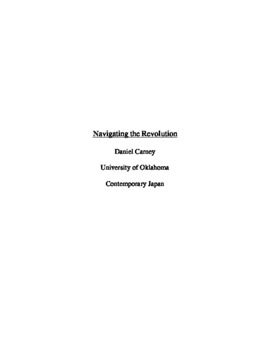| dc.description.abstract | “I believe that, regrettable though it is, our defeat in war is imminent and inevitable.” – Prince Konoe. By February 14th, 1945 the Japanese war position had become untenable. The Japanese military had been suffering unsustainable losses since the Battle of Midway, Allied forces were steadily advancing in the Pacific, and American B-29 bombers operated with near impunity in the Japanese skies. On that day, Prince Fumimaru Konoe dropped a bombshell of his own. Realizing the precariousness of the situation, and fearing for the continuity of the government and potential communist machinations, Konoe called upon the Emperor to end the war before it was too late. He was ignored, and Yoshida Shigeru, former ambassador to Great Britain and future Japanese face of the occupation era, was imprisoned for aiding in the drafting of the statement. As war continued, and Japan’s cities were reduced to ash the inevitability of Japan’s defeat became all too apparent, particularly to the Allied Powers. The Allies realized that they were in a perfect position to dictate terms of surrender. On July 26th, they did just that with the Potsdam Declaration. No conditions were to be accepted from Japan in surrender. On August 6th, Japan would become the first and only nation to ever suffer the terrible havoc of the atomic bomb. Nine days later on August 15th, Japan capitulated. Konoe’s worst fears seemed realized. The total defeat of Japan meant that nothing was safe. Not the Government, not the Japanese way of life, not even the Emperor. | en_US |
